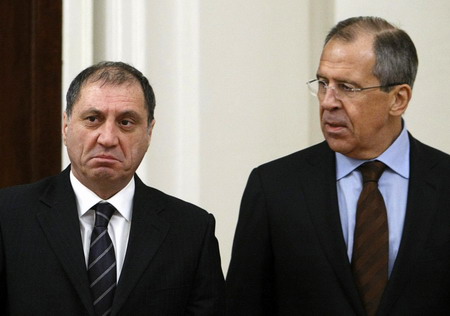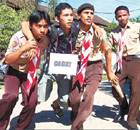Global General
Once at war, Russia and Georgia agree to open border
(Agencies)
Updated: 2009-12-25 10:49
 |
Large Medium Small |
|
 Russia's Foreign Minister Sergei Lavrov (R) meets with Sergei Shamba, minister for foreign affairs of Georgia's rebel region Abkhazia, in Moscow December 24, 2009. [Agencies] |
TBILISI/MOSCOW: Georgia said on Thursday it had agreed to open a mountain pass on the border with Russia, in a first sign of a possible thaw in relations between the two ex-Soviet nations since their August 2008 war.
"According to our preliminary verbal agreement with the Russian side, the Verkhny Lars checkpoint will open in early March," Georgian Deputy Foreign Minister Nino Kalandadze told a news conference.
A spokeswoman for Russia's Foreign Ministry said it was preparing a statement on the issue. The pass, located some 30 km (20 miles) south of the Russian city of Vladikavkaz, links it with the Georgian capital of Tbilisi.
There has been no border traffic or flights between Russia and Georgia since the war. On Tuesday, Georgian airlines Airzena asked the Russian government to allow it to run charter flights between Tbilisi and Moscow during the winter holiday period.
"We assess the resumption of air links positively. We hope that negotiations between private air companies on resumption of flights will result in a positive decision," Kalandadze said.
Russian Prime Minister Vladimir Putin met former Georgian Prime Minister Zurab Nogaideli late on Wednesday.
At the meeting, Putin fretted about an ill-fated demolition of a World War Two memorial in Georgia last week, which killed a woman and her eight-year-old daughter, and suggested a plan to build a copy of the monument in Moscow.
He said the reconstruction could pave the way for a restoration of dialogue between the two countries, which share a common history and religion. About 1 million Georgians who live in Russia are also keen to keep links with their homeland.
"Relations between Russia and Georgia are in a dire state today," Putin told Nogaideli, now a fierce critic of Georgian President Mikheil Saakashvili.
"This (the restoration of the monument) could become a starting point for the restoration of a dialogue, if not between the authorities but at least between public organisations and civil society," Putin said.
Putin suggested that Russia should restore the monument in Moscow as a sign of gratitude to 700,000 Georgians who fought in World War Two. One third of them died.
The meeting -- which Russian officials said was the highest level contact between the two countries since the war -- has indicated that a thaw in ties was possible although Nogaideli currently carries little weight in Georgian politics.
President Dmitry Medvedev said on December 9 said he saw no obstacle to resuming visa-free travel and air links, though Moscow has repeatedly said there will be no official contact with Georgia as long as Saakashvili remains in power.
Russia's previous attempts to create a more Russia-friendly opposition movement in Georgia fell through, and anti-Russian sentiments prevail in Georgian society, while politicians seeking contacts with Russia remain mavericks.
"From my point of view, Nogaideli is a sensible man. He sees the perspective, and this differs him from other politicians who do not see this perspective and do not want to see it," Russia's Deputy Foreign Minister Grigory Karasin was quoted as saying.











